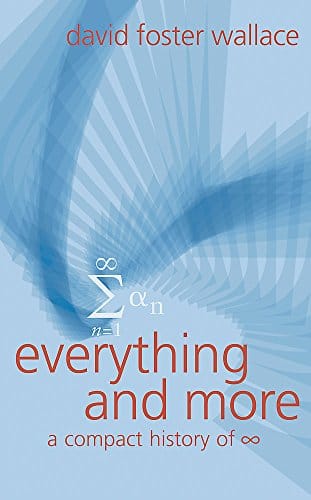David Foster Wallace's infinite seriousness

Did you know that David Foster Wallace wrote a book about actual infinity?

Like many people, I was aware of David Foster Wallace because of Infinite Jest. His very long and difficult novel/memoir that is widely admired and rarely read. I had tried and failed myself. Wikipedia classifies it as Hysterical realism, Satire, Tragicomedy, Postmodern, Science Fiction. I'm sure he meant well but i found it too self-indulgent. Everything and More could not be more different. It's a joyful celebration of the mathematics and mathematicians behind all the infinities.
I knew that infinities were big but I hadn't appreciated the extent to which they are also a Big Deal. Mathematicians have wrestled with the concept of infinity for centuries, from Zeno’s paradoxes to Cantor’s hierarchy of transfinite numbers. What Wallace manages to do in Everything and More is capture not only the technical brilliance of these ideas but also their strange beauty and dangers some say they pose to the foundations of mathematics. He writes about Cantor, for example, with a mixture of awe and sympathy, showing how the man who revealed the infinite’s hidden order also paid a heavy personal price for his obsession. The book is less a textbook and more a guided tour, where Wallace is at his eloquent best - respectful of readers and material, pointing out the dazzling landscapes and oddities along the way without going on excessively.
What struck me most is how infinity destabilizes our intuitions. We’re used to numbers behaving in neat, predictable ways: bigger, smaller, divisible, not divisible. Infinity, however, bends those rules. Some infinities are bigger than others. Some can be counted, some can’t. This isn’t just a parlour trick of mathematics—it changes how we think about continuity, space, time, and even the limits of human knowledge. Wallace makes you feel the vertigo of standing on that edge, and then he steadies you with wit and analogies that feel like lifelines.
And so, reading Everything and More left me with a renewed sense of wonder about mathematics itself. You can also see the Wallace's intellect and obsessional nature on display. Not in the grating and pretentious way of Infinite Jest but by reading between the lines - noticing how effort he has made to understand this abstruse area of arithmetic. Far from dry or abstract, it is alive with paradox, invention, and daring leaps of imagination. Wallace reminds us that mathematics is not only about solving problems but also about confronting the unsolvable, staring into the infinite, and trying to make sense of it. For me, that was more inspiring than Infinite Jest ever managed to be. Wallace may have been a novelist by trade, but in this book he became something rarer: a poet of mathematics.
